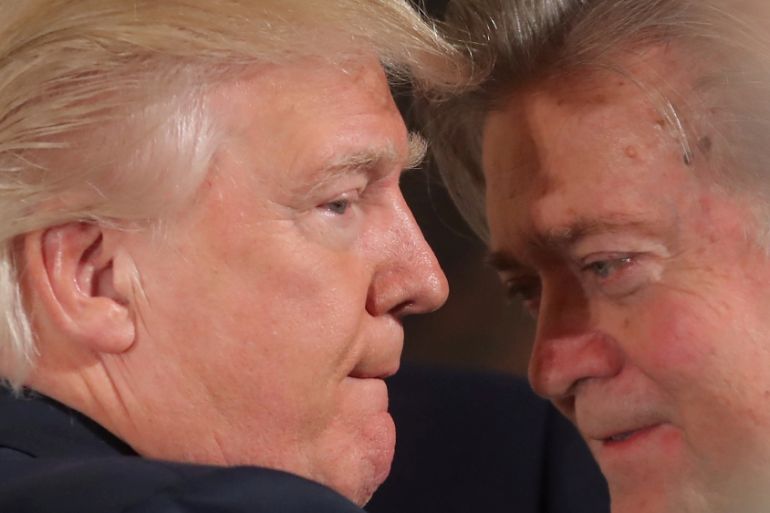Decoding Steve Bannon’s ouster from the NSC
Trump’s decision to oust his chief strategist Bannon is significant, but it doesn’t mean populism left the White House.

Ousting Chief Strategist Steve Bannon from the National Security Council (NSC) is one of many shake-ups that will continue to define Donald Trump’s White House. Yet, this realignment is different in the impact it will have on US foreign policy.
Even though the move appears like a sudden game changer, it is a merely an aftershock of unseating Mike Flynn in February. The current national security adviser, H R McMaster, has been striving to streamline the policy advice that flows to the president, manage the administration’s competing power centres and preserve the NSC from the investigations haunting the White House. The low-profile warrior scholar has reshuffled the dynamics of the White House’s Situation Room (the boardroom, in Trump’s lingo) where decisions are made by elimination and by who has the president’s ear.
Keep reading
list of 4 itemsTrump’s defence makes opening statement in ‘hush money’ trial
Man sets himself on fire outside of Trump’s New York hush-money trial
Full jury panel seated on third day of Trump’s New York hush-money trial
The April 4 memorandum that once again reorganised the NSC is the byproduct of a compromise between those who want to de-politicise the council and those who seek to de-operationalise it. Simply put, McMaster had his way in removing a political operative while committing to downsize an institution that significantly grew in staff and influence under former President Barack Obama.
Indeed, the previous US administration has micromanaged national security decisions. Flynn continued that insular decision-making style but was butting heads with cabinet-level secretaries and creating new layers of management to override his own staff.
The White House’s intrusive approach in the internal operations of federal agencies had a miraculous impact in Washington. The Pentagon, the State Department and the Central Intelligence Agency, which traditionally compete for power, began synchronising efforts to make their voices heard. McMaster is putting these bureaucratic concerns at ease by reverting to the old format of traffic control role where the national security adviser reconciles conflicting policies coming to the president instead of advancing his or her own agenda. That trend will ultimately restore the ritual of federal agencies vying to influence White House policy.
Why ousting Bannon matters
|
|
Beyond the policy process, there are significant repercussions for that personnel move. First Bannon’s ousting will ultimately disengage populism from national security policy and will create a dividing line between Trump’s domestic political turmoil and his foreign policy.
Second, the national security establishment that Trump has long criticised is gradually turning the White House into a conventional US administration.
Third, we no longer have a separation between national and homeland security that has misguided Trump’s campaign narrative; both are now under McMaster’s portfolio.
While we were told in February that Trump was upset about not being fully briefed on the executive order giving Bannon a NSC seat, the White House is asserting that the only news here is that Bannon’s services of watching over Flynn are no longer needed. However, in a town such as Washington it matters who is up and down in power politics. The White House’s desperate attempt to explain such a crucial personnel change makes it hard to see how Bannon can remain relevant moving forward.
OPINION: Remaking the Republican Party – Populism a la Trump
The so-called “Prince of Darkness” has been building an aura around his character; he sees himself as the reformer chief minister Thomas Cromwell under King Henry VIII of England and has famously coined the term “deconstruction of the administrative state”. Yet, Bannon’s nationalist agenda has been politically wounded in the past few weeks. The White House’s budget proposal is far from being considered populist and will not survive Congress, the shockwave of executive orders backlashed on Trump, the border wall with Mexico is not gaining traction and Bannon’s tough tone with the House’s Freedom Caucus did not help secure enough congressional votes to repeal Obamacare.
One thing became clear after the April 4 memorandum; when dust settles on this presidency Bannon for Trump will not be Karl Rove for George W. Bush or Henry Kissinger for Richard Nixon.
It is no secret that Trump likes to win. Since the November 8 presidential election, Bannon has yet to hand him a feasible political victory. To add insult to injury, while Bannon was being ousted from NSC, Trump’s son-in-law Jared Kushner was in Iraq taking a military crash course on fighting the Islamic State in Iraq and the Levant (ISIL, also known as ISIS). The weeks and months to come will tell us if the clout of Bannon has really diminished. Will he take part in meetings with foreign leaders? Will he play a key role in the coming congressional battle of tax reform?
Only a military person could have convinced Trump to revoke the 65-day NSC membership of his wingman Bannon. McMaster is consolidating control and becoming the go-to contact for foreign diplomats and officials, yet he might struggle to monopolise the coordination of national security policy. One of his most significant challenges is how to deal with the shadow Secretary of State Kushner, who has his own open diplomatic channels – China, Israel and Mexico to name a few.
Make no mistake, Bannonism is not dead. Whenever Trump turns to election mode, populism will be his impulse and no one better than Bannon can bring that message home. However, one thing became clear after the April 4 memorandum: When dust settles on this presidency Bannon for Trump will not be Karl Rove for George W Bush or Henry Kissinger for Richard Nixon.
Joe Macaron is a policy analyst at the Arab Center, Washington DC.
The views expressed in this article are the author’s own and do not necessarily reflect Al Jazeera’s editorial policy.
